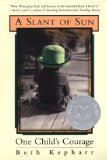A story of courage
 What would you do if your toddler stopped talking expressively, and began echoing your words? Or if he spent hours arranging his toys into intricate patterns only to stare at them? Or if she was unstrung by guests in the house? Or, finally, if the only diagnosis offered after a battery of tests was something as vague as “Pervasive Developmental Disorder not otherwise specified”?
What would you do if your toddler stopped talking expressively, and began echoing your words? Or if he spent hours arranging his toys into intricate patterns only to stare at them? Or if she was unstrung by guests in the house? Or, finally, if the only diagnosis offered after a battery of tests was something as vague as “Pervasive Developmental Disorder not otherwise specified”?
A Slant of Sun: One Child’s Courage describes how Beth Kephart and her husband respond. It tells the tale of how the bright, remarkable boy encountered in this book’s sequel, Seeing Past Z: Nurturing the Imagination in a Fast-Forward World, overcomes a disability that bears some similarity to autism. I couldn’t put it down. It inspired me, moved me, motivated me. Love heals. I never tire of stories about how.
In A Slant of Sun, the professional counsel offered is helpful to an extent. It gives a vocabulary, a starting point for treatment, and some useful priorities and techniques. But providing Jeremy with the inner freedom and safety he needs, and finding the environments most conducive to his growth, take his parents down an uncharted, often lonely course. The strands that hold them together are their love for him, their willingness to learn to trust their intuition, and their faith in the amazing giftedness apparent in their son even when Jeremy is at his most troubled.
Shortly after receiving the diagnosis, Kephart spends days (and sleepless nights) reading everything she can find on the subject. She finds nothing helpful in the way of professional consensus, nothing hopeful or even certain about the prognosis for someone with PDD. Finally, in the pre-dawn solitude of a silent house, she reaches a decision:
…I pound the books, the Xeroxed pages with my fist. I pledge to the boy and to his father, both sleeping above me, that I will not, no matter what, confuse my child with a label. I will not be taken down by false constructions, empty forecasts. I will not lose sight of the gift that my son is, will not let go of my expectation — my surety — that Jeremy will find his way into this world.
It’s a key moment that sets the parameters of the story. And it illustrates how part of what makes this tale so powerful is its universality. It speaks as a meaningful personal story about a unique case, but at the same time it articulates the struggles of all parents and all children, with or without an official “disability.”
For instance, don’t all of us worry about things we observe in our children? As one school principal quoted in this book says, “Every kid has his left or right of center.” But how will we choose to see them? As problems — or gifts? Will we see their sometimes worrisome preoccupations as symptoms of something wrong — or part of their promise, their amazing and unique offering to the world? This is a story of parents who don’t lose sight of their son, who respect the integrity of who he is and leave him intact. As a result he develops the courage to “find his way into this world.”
I also appreciated the honesty of A Slant of Sun, especially in its depiction of the sometimes crippling self-doubt that was part of parenting this child. Most of us have wondered at one time or another, how much is it our fault when our children struggle? We’re flawed people; there’s no other kind. Will we trust ourselves — or take refuge in the experts? The question can arise in so many contexts: how to discipline, to educate, to “socialize” our children. So much in our conventional understanding, and our public institutions, is geared toward creating sameness, sanding off the rough edges that make individuals stand out. But wisdom aims to encourage wholeness. Sometimes this means striking out in a different direction. It takes bravery to resist the expert advice, a bravery that feels pretty audacious in the face of our glaring imperfections.
The path the family in this story chooses requires courage. But there is no arrogant claim in these pages that parents always know what their children need. There is a hard-won faith, not in parental clairvoyance, but in love. Love assures that even in the toughest seasons, a child is not alone. Love can cover a multitude of sins, missed opportunities, tried and failed attempts. This is what gets me out of bed in the morning. I’m thankful for this hopeful book that bears witness to it.


